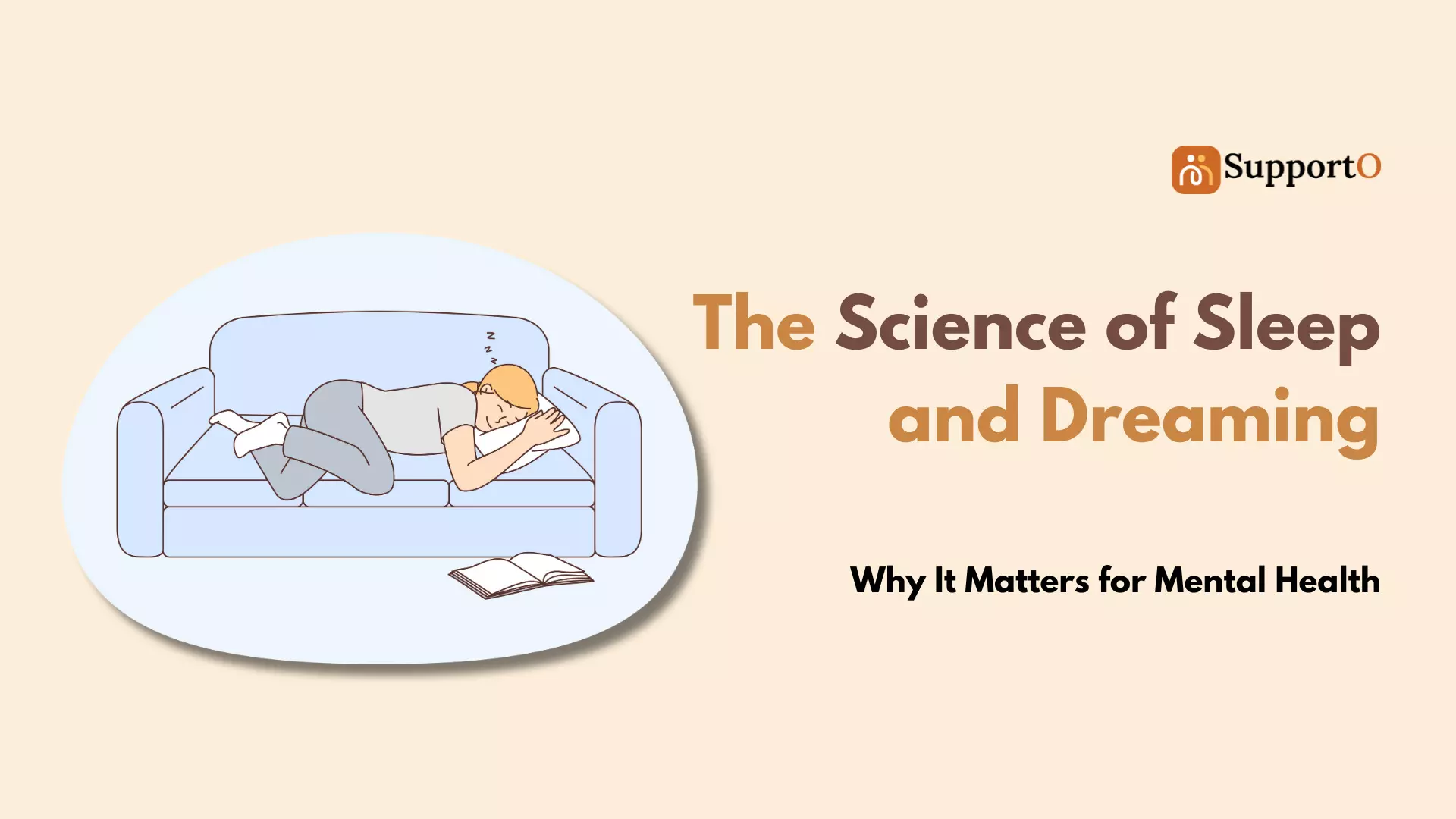The Science of Sleep and Dreaming: Why It Matters for Mental Health
Sleep isn’t just rest; it’s crucial for emotional stability, mental functioning, and overall mental health. In the fast pace of modern life, many people suffer from poor sleep linked to stress, anxiety, and depression, and neglect the fact that sleep can be a major factor for one’s emotional stability.
As World Sleep Day comes around the bend, it’s a great time to draw attention to why sleep is important for our emotions, psyche, and general well-being. This blog delves into the science of sleep, what dreams tell about our mental state, and what tools like SupportO, an online emotional support, can help those experiencing struggles due to sleep disruptions.
All you need to know about SLEEP: It is not just a necessity
Sleep — a complex biological process underlying our mental and emotional health. A sleep cycle is the alternation between rapid eye movement (REM) and non-REM (NREM) sleep stages. Sleep cycles repeat every 70 to 110 minutes, and a typical night's sleep consists of four to six cycles. It is composed of several cycles that can be broadly grouped into:
Non-REM sleep: The process of the deep phase of sleep, during which the body repairs itself and the immune system strengthens.
Stage 5: REM Sleep (Rapid Eye Movement): The dream stage, crucial for memory consolidation and emotional processing.REM sleep is important for dreaming, and experts believe dreaming helps you process emotions
A sleep deficit impairs cognitive performance, diminishes emotional regulation and increases the risk of depression, anxiety and mood fluctuations. Research has found that inadequate sleep can exacerbate negative thinking and feelings, causing normal stressors to feel more debilitating.
The Relationship Between Sleep and Mental Health
Sleep is a potent tool of emotional health and matters a lot for your mental well-being. Here’s how:
Regulates Emotions and Mood
Research shows that sleep directly impacts mood and emotional regulation. Lack of sleep makes irritability soar, emotional reactivity spike, and stress harder to manage. Chronic insomniacs have increased rates of depression and anxiety disorders.
Decrease Stress and Make Coping Skills Stronger
Good sleep helps our brain make sense of experiences throughout the day so we can respond more calmly to things that trigger us. Sleep also increases cortisol (the stress hormone) and causes us to become more reactive to negative situations.
Improves Cognitive Function and Decision Making
Sleep improves alertness, focus, and problem-solving. When sleep deprived, the mind does not work properly, cognitive functioning deteriorates, leading to short memory lapses, brain fog, and bad decisions.
Aids the Healing and Recovery of the Mind
Sleep, and Sleep is the Body’s Natural Mental Health Therapy. In deep sleep, the brain purifies itself, refines some neural connections, and facilitates healing, a crucial commendation for those who perceive to be depressed with anxiety.
Why Do We Dream? How Night Visions Affect Our Emotional Health
Dreaming serves an important function for our emotional well-being. Research shows that dreaming assists with processing emotions, relieving stress and even solving personal problems.
Restructuring Underlying Emotions: Dreams are a sort of subconscious therapy session, where the mind can sort through memories and process repressed emotions.
Decreasing anxiety: Positive dreams work towards balancing the emotional state, while nightmares often represent unresolved stress and anxiety.
But What About Dreams? Despite an absence of definitive, scientific consensus, many breakthroughs in scientific advancements to literature and even art have come through dreams, highlighting their significant impact on cognitive function.
The Relationship Between Sleep Deprivation and Mental Health Disorders
Sleep deprivation is a significant risk factor for mental health disorders including:
A. Depression: Lack of sleep alters neurotransmitters, resulting in more severe depressive symptoms.
B. Anxiety Disorders: Sleep deprivation increases the hyperactivity of the amygdala (the brain’s fear center), resulting in increased anxiety.
C. Bipolar Disorder: Sleep disruption can bring on mood swings and worsen symptoms of bipolar disorder.
Sleep Better, Improve Your Emotional Health
If you’re having trouble sleeping, these evidence-based strategies may help:
a) Establish a Sleep Routine
- Sleep and wake up at the same time every day.
- Establish a nighttime (reading, meditation or gentle stretching) sustainability routine.
b) Create a peaceful sleep environment
- Make your bedroom dark, cool, and quiet.
- Reduce your exposure to blue light by limiting screen time before bed.
c) Manage Stress and Anxiety
- Do mindfulness, and deep breathing.
- Join anonymous guidance and relief support such as SupportO for anonymous guidance and stress relief.
d) Avoid Stimulants Before Bedtime
- Limit caffeine and alcohol consumption, especially in the evening.
- Skip heavy meals right before bed.
e) When You Need Help Seek Professional Help
But if persistent insomnia, stress, or emotional distress is a bigger issue for you, consider seeking the help of a mental health professional, or turn to platforms like SupportO who offer anonymous emotional support and guidance.
How Supporto can help with Sleep and Mental Wellness
SupportO is an emotional support platform which is there to assist people with their emotional journey through life — even when it comes to sleep. Here’s how it can help you get help:
a) Get anonymous support: You can get help that is non-judgmental either from professionals or from a supportive community.
b) Guided relaxation exercises: Includes meditations, breathing exercises, and sleep therapy.
c) Mental health advice: Get personalized tips for dealing with stress, anxiety, and sleep problems.
Conclusion
Sleep isn’t something to be indulged in — it’s a necessity for good mental health, emotional stability and stress management. You’ll learn how to get more out of your sleep, with small adjustments, and how doing so can drastically increase your mindset, emotional stability, and essential quality of life.
If you’re struggling, though, there are platforms, such as SupportO, that offer an online emotional support system that preserves your anonymity and can help you manage stress levels, anxiety and sleep issues. This World Sleep Day, take one step toward prioritizing your rest and mental wellness.
